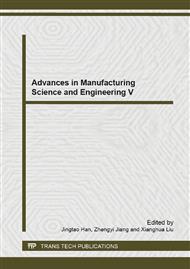p.1531
p.1535
p.1539
p.1543
p.1547
p.1552
p.1558
p.1561
p.1565
Study on a Fuzzy Logic Control Strategy of Regenerative Brake for Vehicular Hybrid Power Source
Abstract:
Due to the lack of cruising ability in HEV(Hybrid Electric Vehicle), along with concerns about environmental issues, a hybrid power source built from a battery and an ultracapacitor is used as vehicular power source and is charged during braking processes. Based on the rule of “the lower ultracapacitor voltage, the less battery charging; the higher ultracapacitor voltage, the more battery charging”, this paper adopts a fuzzy logic control strategy to supervise the braking energy. Simulation results obtained using MATLAB/SIMULINK indicate that this method can effectively manage the energy distribution during regenerative braking processes and extend driving distance. Furthermore, the present approach provides an improvement in fuel economy and reduces pollutant emissions.
Info:
Periodical:
Pages:
1547-1551
Citation:
Online since:
June 2014
Authors:
Price:
Сopyright:
© 2014 Trans Tech Publications Ltd. All Rights Reserved
Share:
Citation:


